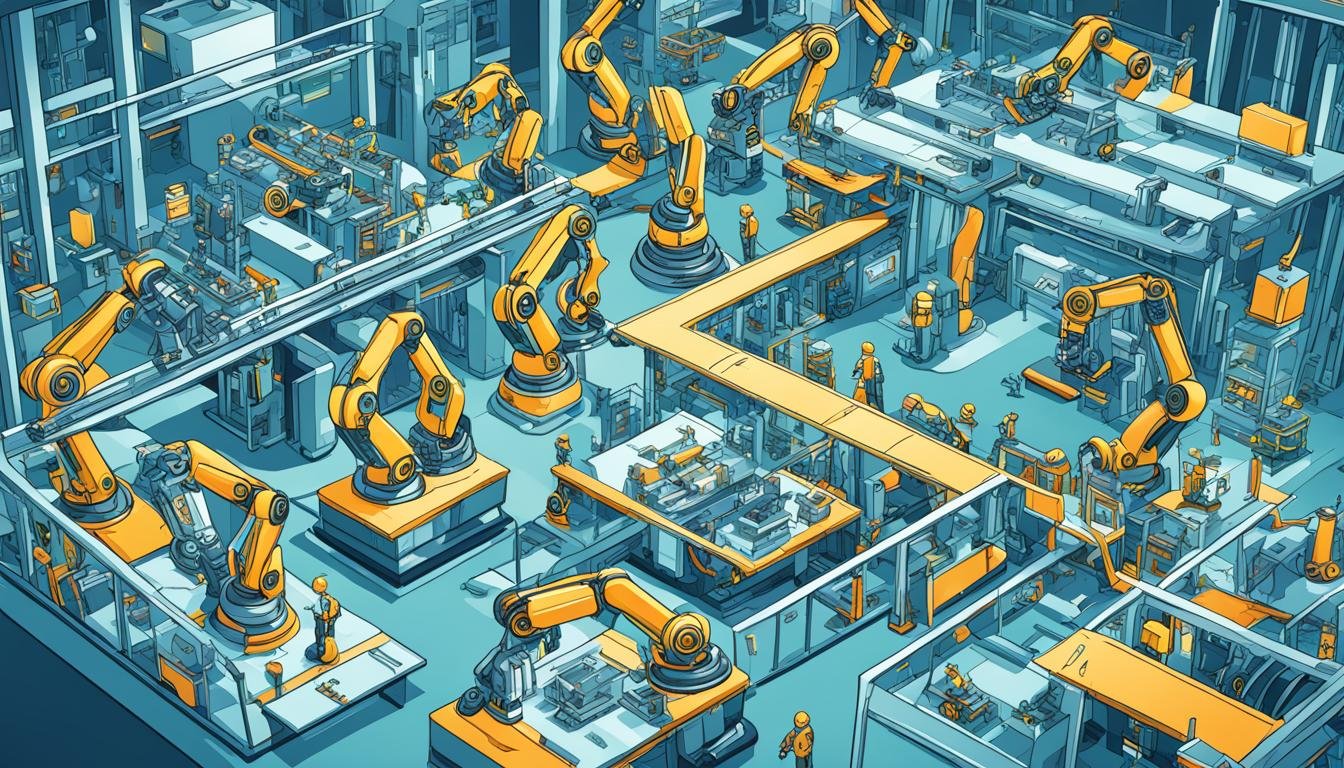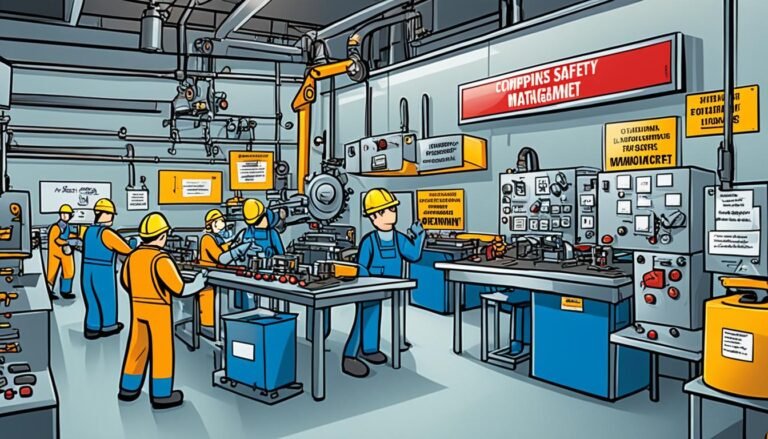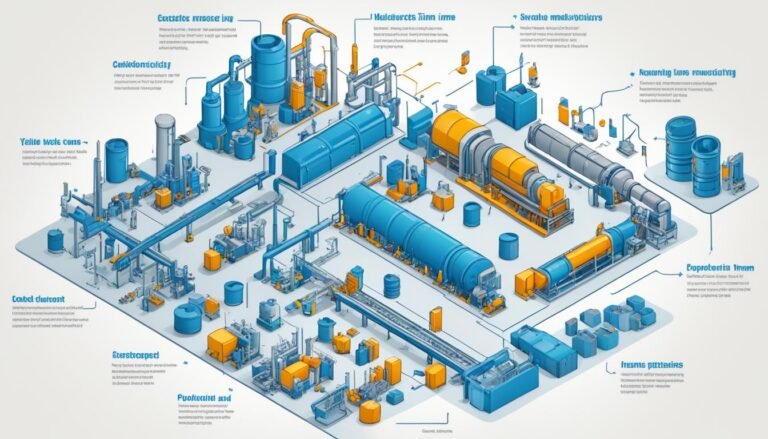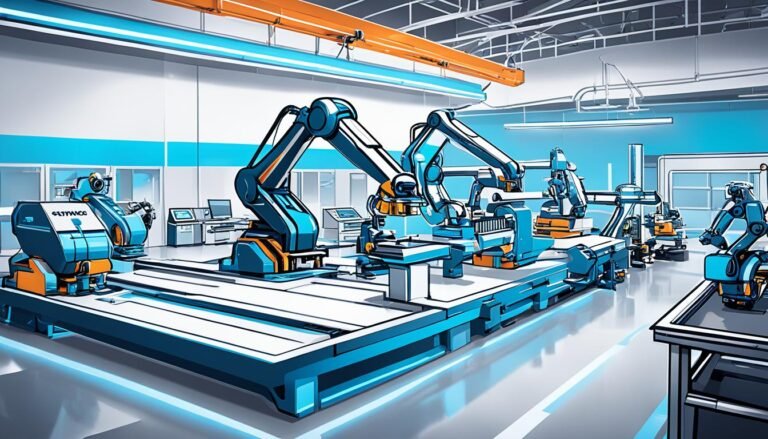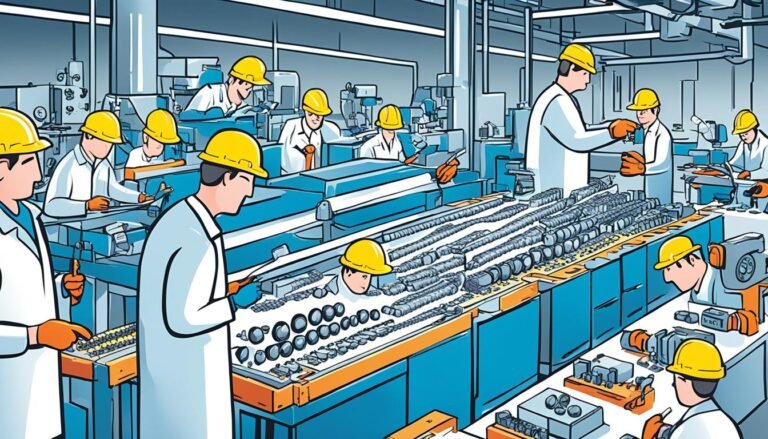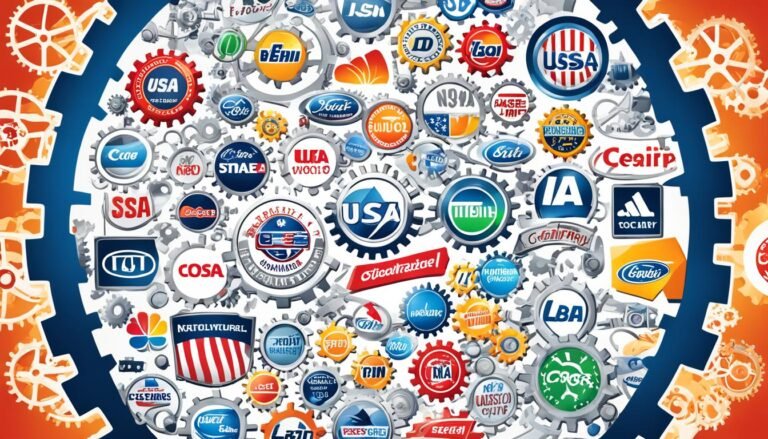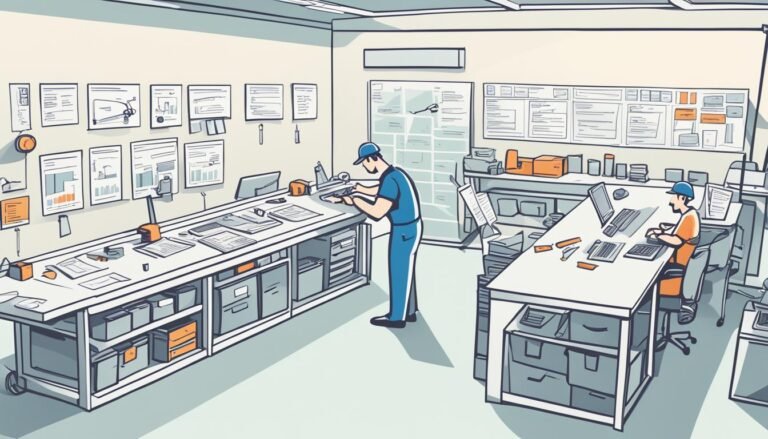Training for Advanced Manufacturing Technologies
Did you know that there is a 90% placement rate after finishing the Advanced Manufacturing program at Suffolk County Community College? This shows how effective the training is in launching careers in advanced manufacturing.
The Advanced Manufacturing Training Center at Suffolk County Community College is a top choice for those wanting to improve their skills. It offers a wide range of programs that mix practical training with theory. Students can learn about CNC Operator, Welding, IPC certification, and PLC/Industrial Automation. Completing these courses leads to both Completion Certificates and National Certification, making students stand out in the job market.
This training is designed for both new and experienced workers. It prepares them for the changing needs of the manufacturing industry.
Key Takeaways
- The Advanced Manufacturing program boasts a 90% placement rate upon completion.
- Advanced Manufacturing Training Center provides extensive training in CNC, Welding, and PLC/Industrial Automation at Suffolk County Community College.
- Programs offer options for both Completion Certificates and National Certification.
- Training blends classroom theory with hands-on learning suitable for both novices and experienced workers.
- Certified Remote Testing Facility offers national certifications like IPC, AWS, NATE, Certiport, and NIMS.
Introduction to Advanced Manufacturing
Advanced manufacturing is all about innovation. It offers great career paths like being a manufacturing operator, maintenance technician, quality control specialist, or process control engineer. Amatrol’s Advanced Manufacturing Training Program meets the industry’s needs. It trains people in a wide range of technical skills, focusing on real-world industrial processes. This training helps people move into specialized technology roles.
The program has 25 online courses that you can do at your own pace. Each course is 60-90 minutes long, making it easy to fit into your schedule. For $389, you get access to top-quality content for 120 days after you sign up. This way, everyone can learn, whether you’re in high school, a veteran, or moving from another field.
| Course Code | Units | Topics Covered |
|---|---|---|
| MFGT 101 | 2 Units | Lean Manufacturing Overview |
| MFGT 102 | 2 Units | Introduction to CNC Machines |
| MFGT 103 | 3 Units | Introduction to OSHA |
| MFGT 201 | 3 Units | Employability Soft Skills |
| MFGT 202 | 3 Units | Mathematical Analysis |
| MFGT 203 | 3 Units | Assembly Processes |
| Graduate Thesis | 9 Units | Group Project |
| Professional Seminar | 3 Units | Global Manufacturing and Entrepreneurship |
| Elective Courses | Varies | Mechanics of Solid Materials, Introduction to Robotics, etc. |
After finishing the program, you might get credits for the Mechanical Engineering Technology Program at STCC. You’ll also be ready to take the SME Certified Manufacturing Associate (CMfgA) Exam. This exam has 75 questions and you need to score 70% to pass. The exam costs $75.
If you pass, you can move on to more education like the CNC Operations Certificate or the Mechanical Engineering Technology Associate’s degree at STCC. This opens up many doors in industrial careers and advanced manufacturing.
Core Training Programs Offered
The Advanced Manufacturing Training Center offers key programs that are vital for modern manufacturing. These include CNC Operator Training, Welding and Certification, and PLC/Industrial Automation. Each course is designed for both beginners and those looking to advance their skills.
CNC Operator Training
The CNC machine operator program teaches over 130 key skills. This makes trainees much better at their jobs. The program covers both theory and practical skills needed for jobs like machinists and quality technicians.
For example, NVCC’s Manufacturing Basics Certificate program includes blueprint reading, metrology, math, and hands-on training. This is a great example of the training offered.
Welding and Certification
Welding courses range from basic to advanced, covering important skills for construction and maintenance. At NVCC, welding training teaches methods like GMAW/MIG, GTAW/TIG, and SMAW/STICK. The focus is on safety, technique, and preparing for AWS certification.
Customized training also focuses on welding safety and improving techniques. This ensures trainees get a wide range of skills for manufacturing.
PLC/Industrial Automation
The PLC certification program is key for those interested in industrial automation. It gives a deep understanding of industrial control systems. This prepares people to manage complex operations in manufacturing.
Courses cover process improvement, technical writing, and energy management. Trainees can also get certifications like the Manufacturing Leadership Certificate and the Quality Core Tools Certificate from GaMEP. These certifications boost their skills in automated manufacturing.
| Program | Course Highlights | Provider |
|---|---|---|
| CNC Operator Training | 130+ skills, blueprint reading, hands-on equipment training | NVCC |
| Welding Training | GMAW/MIG, GTAW/TIG, SMAW/STICK, AWS certification prep | NVCC |
| PLC/Industrial Automation | Industrial control systems, process improvement, leadership training | GaMEP |
These comprehensive programs help participants grow their skills in manufacturing. They prepare them for the many job opportunities in the industry.
Hands-On Learning and eLearning
Amatrol’s Advanced Manufacturing program bridges the gap between theory and practice. It uses interactive multimedia and virtual trainers for a dynamic learning experience. With over 3,500 installations worldwide, Amatrol leads in offering comprehensive training solutions for different learning needs and preferences.
Interactive Multimedia Curriculum
Amatrol’s multimedia software is a key feature for interactive technical skill development. It works on server/PC installations and is also available on eLearning platforms for 24/7 access. The software uses eye-catching graphics, 3D simulations, and detailed content to help learners grasp advanced manufacturing concepts.
To support just-in-time skills, Amatrol offers Learning Activity Packets (LAPs). These cater to various learning styles and improve the educational experience. The CNC Machine Operator program, for instance, covers 130+ skills over 80+ hours, with 24 self-paced units and guides for instructors and on-the-job training.
Virtual Trainers
Amatrol’s virtual manufacturing training turns theory into practical experience without the need for physical equipment. These virtual trainers mimic real equipment, making training cost-effective and accessible. Students can learn at their own pace, gaining a deep understanding of machinery and operations.
Amatrol also uses the FaultPro system for automatic fault insertion. This feature allows for realistic troubleshooting practice. It prepares learners for real-world challenges and boosts their problem-solving skills.
| Key Feature | Description |
|---|---|
| eLearning Platforms | 24/7 access to comprehensive training materials. |
| Interactive Technical Skill Development | Eye-catching graphics, 3D simulations, and in-depth content. |
| Virtual Manufacturing Training | Realistic replication of hands-on equipment for cost-effective training. |
| Learning Activity Packets | Supports just-in-time skills and various learning styles. |
| FaultPro System | Automatic fault insertion for realistic troubleshooting experiences. |
Addressing the Skills Gap in the Industry
The manufacturing sector is facing a big challenge: the manufacturing skills gap. By 2030, there will be 2.1 million unfilled U.S. manufacturing jobs. This makes it crucial to focus on training and working together with the industry.
Veteran Training Programs
The Academy of Advanced Manufacturing is a key program tackling this issue. It’s a partnership between Rockwell Automation and ManpowerGroup. This program helps U.S. military veterans get the skills they need for jobs in manufacturing.
Veterans get training that prepares them for advanced manufacturing jobs. This not only helps them find work but also brings dedicated professionals to the industry.
Industry Partnerships
Working together is vital for training the next generation of workers. Rockwell Automation and ManpowerGroup have teamed up to make sure their training meets industry needs. They focus on preparing workers for today and tomorrow’s manufacturing challenges.
These partnerships ensure training is relevant and effective. They help create workers who are ready to adapt and grow with the industry.
| Key Statistics | Impact |
|---|---|
| 2.1 million unfilled U.S. manufacturing positions by 2030 | Potential $1 trillion loss in GDP |
| 800,000 current job openings in manufacturing | Significant gap in workforce supply-demand |
| 83% of manufacturers struggle to attract quality workforce | Operational delays and missed opportunities |
| 45% of manufacturers turned down opportunities due to worker shortage | Lost business and slowed growth |
| 25% of the manufacturing workforce retiring in the next decade | Drain of expertise and knowledge |
In conclusion, programs like the Academy of Advanced Manufacturing and strong partnerships are key to solving the skills gap. By focusing on these areas, we can build a strong, skilled workforce ready for the future of manufacturing.
Conclusion
The manufacturing industry is changing fast, needing advanced training in new technologies. The National Association of Manufacturers predicts 4.6 million new jobs by 2028. This makes it crucial to improve skills. America Makes and MxD’s partnership with the University of Maryland–Baltimore County shows how important education is for advanced manufacturing jobs.
Programs like NextFlex’s FlexFactor and NIIMBL’s eXperience program show how schools and the industry work together. They offer real-world experiences, even during tough times like the pandemic. The Manufacturing USA network uses funds from different levels of government and private sources. This has led to big investments and many research and development projects.
Closing the skills gap is key to making operations smoother and improving product quality and safety. Training centers with the latest technology are crucial for this. By promoting ongoing learning, the manufacturing sector can keep its workers ready for the future. These efforts are not just for personal growth but also for the industry’s success and global competitiveness.
Source Links
- Advanced Manufacturing Technology • CT State Community College Tunxis
- Advanced Manufacturing | Academic And Career Programs | Austin Community College District
- WMAN-001 Introduction to Advanced Manufacturing
- Manufacturing Technology (MFGT) < Evergreen Valley College
- Advanced Manufacturing and Design Innovation @ MIT
- Courses, Certifications and Customized Training
- GaMEP at Georgia Tech Training for Manufacturers
- Advanced Manufacturing Training Program | Hands-on Skills for Industrial Careers – Amatrol
- Principles of Advanced Manufacturing eLearning | Interactive Multimedia – Amatrol
- Addressing the Skills Gap in Manufacturing Through Robotics Training
- Overcoming the Skills Gap in Manufacturing
- Addressing the Challenges in Advanced Manufacturing – Digital Transformation In Advanced Manufacturing
- Training the Future Advanced Manufacturing Workforce with Online Learning
- Closing the Technology Skills Gaps in Manufacturing With Training

